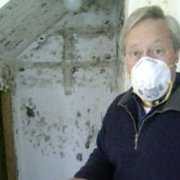Mold Proven to Be the Cause of Severe Asthma
Manchester, UK – Scientists at Manchester University have made a major breakthrough in treating asthma. They have discovered that severe asthma is triggered by an allergic reaction to fungus.
For years the condition has been blamed on air pollutants like dust mites, smoke, animal hair, car fumes or pollen. But in the largest study of its kind in the world, experts say they have pinned down the main culprit for the first time. In another world-first, they are testing a drug which could prevent severe sufferers having the sort of asthma attacks that usually require hospital treatment. The antibiotic wouldn’t be a cure for all asthmatics as it is only severe asthma which is sparked by fungus, but it could save countless lives.
Asthma claims around 1,400 lives a year in Britain, but little is still known about its cause. The Manchester researchers discovered that severe asthma appears to be caused by common airborne fungi like household mould, damp, dead leaves, trees and grass. Although the tiny spores, which outnumber pollen grains almost 1,000 to one, are invisible to the naked eye, they are inhaled all the time, especially in autumn.
Most people do not have a reaction, but in severe asthmatics the fungus is thought to make the airways narrow, making it harder to breathe, causing wheezing and coughing. The first trial on 46 severely asthmatic patients around Greater Manchester indicated that 75 per cent were allergic to one or more fungi in the air. Just 16 per cent of people with mild asthma were allergic to fungus.
Trial
Now, the team which works across four northern UK hospitals, is starting a year-long trial to test a drug on 100 asthmatics, which could prevent attacks by killing the fungus inhaled into the body. Severe asthma affects 20 per cent of Britain’s five million sufferers. If the drug treatment is successful, it could help thousands who have to rely on steroid inhalers to prevent an attack or other inhalers to widen their air passages if they become breathless.
Lead trial investigator Dr Robert Niven, from the North West Lung Centre at Wythenshawe Hospital, said: “We have few options for patients with severe asthma other than prescribing more steroids, and those we do have can have side effects worse than steroids themselves.
This anti-fungal drug is not a treatment that will work for all asthmatics, but there are thousands of people in the UK that it could help. It could stop people being hospitalized and it would hold hope for a lot of people.” Preliminary tests by the team at Wythenshawe, North Manchester General, Hope Hospital and Preston Hospital on 26 patients with severe asthma have been very promising. One woman – with a history of being hospitalized and put on a ventilator in severe asthma attacks – has not had to return to intensive care since she started the course of tablets.
Researchers hope the drug will soon be licensed for severe asthma.


 ©Today's Homeowner
©Today's Homeowner 




